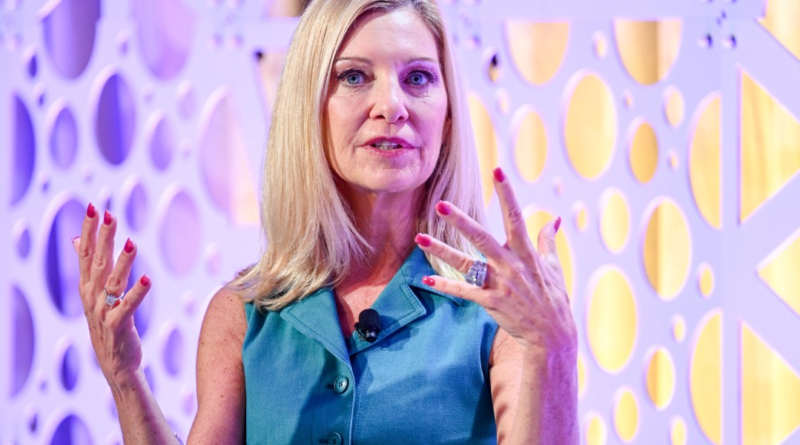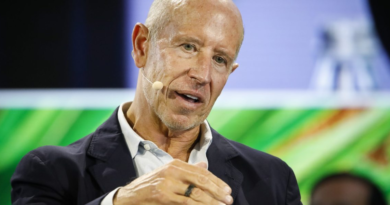Fortune 500 list: The top 10 companies dominating business
This year marks the 70th anniversary of the Fortune 500, a list of the largest U.S companies ranked by revenue. The first edition was published in 1955, with companies like General Motors, Jersey Standard, U.S. Steel, and Chrysler topping the list.
Today, a new cast of characters are dominating. In 2023, Chevron secured the 10th spot on the list, bumping off drugmaker Cencora, after the oil company recorded $36.5 billion in profits last year.
Here are the top 10 companies from the Fortune 500 list in 2023. Our 2024 list will launch in June.
- Walmart
Walmart raked in over $611 billion in revenue last year to secure the first spot for 11 straight years. The company recently completed a $2.3 billion acquisition of TV maker Vizio, a move that experts say will help the company advertise to customers.
The company, headquartered in Arkansas, is run by CEO Doug McMillon and employs over 1.6 million people.
The company also bought entrepreneur Marc Lore’s startup, Jet.com, for $3.3 billion in 2016 and is running a pilot of Lore’s latest company, a restaurant concept called Wonder, in one of their supercenters. Walmart plans to open two to three more of Lore’s restaurants in their retail chains this year.
As one of several retailers, like Target and Home Depot, to report sales losses due to “shrink,” or inventory loss that includes theft, Walmart has recently posted limitations on self-checkout lines to alleviate shoplifting, which accounted for over $112 billion in industry losses in 2022, according to the National Retail Federation.
- Amazon
Amazon, with a yearly revenue of nearly $514 billion, holds the number two spot on the list for the fourth year.
Run by CEO Andy Jassy, the ecommerce giant also offers cloud services and digital advertising along with streaming platforms like Fire TV and Amazon Prime Video. It employs about 1.5 million people. The company has two headquarters in Seattle and Arlington.
Amazon has recently announced an investment of more than $10 billion to build data centers in Saudi Arabia to help the country diversify its oil-dependent economy. Alphabet Inc.’s Google and Microsoft Corp have also invested. Amazon plans to spend $5.3 billion to create new infrastructure in the region to train local developers in 2026.
- Exxon Mobil
Exxon Mobil brought in a revenue of over $413 billion to take the third spot on the list away from Apple this year. The company moved through the rankings from it’s sixth place spot last year, and could owe its success to a year of record-breaking profits for oil and gas companies in 2022.
With CEO Darren Woods at the helm, the company made $55 billion in profits last year and employs over 62,000 people globally. Headquarters are in Houston, Texas.
This year, it’s been involved in a whirlwind of acquisitions from fracking giants to lithium drilling operations, which the company is investing in to remain an industry leader as consumers shift to electric cars. At the end of last year, Exxon Mobil announced plans to drill for lithium in southern Arkansas and expects to produce the material, which is critical for electric vehicles, by 2027.
- Apple
In 2023, Apple dropped to fourth place on this list, but it still holds the title for most profitable company on the Fortune 500—a title it’s held for eight years.
The company, with Apple Park as its headquarters in Cupertino, California, is run by CEO Tim Cook and employs about 161,000 people and generates revenue from key products like the iPhone, Mac, iPad, and software platforms like iOS.
Apple recorded more than $394 billion in revenues in 2023. It’s had a rocky year with regulators–it was fined $2 billion by the European Union’s antitrust commission over a complaint brought by Spotify stating that the company refuses to let streaming services inform iOS users of cheaper off-platform subscriptions, which in turn creates a barrier to competition in the digital music market.
In a statement, Apple has said the Commission failed “to uncover any credible evidence of consumer harm,” and accused Spotify of “coordination with the European Commission.”
- UnitedHealth Group
With a revenue of over $324 billion, UnitedHealth Group is the highest-ranking healthcare company on the Fortune 500 list. It maintained the fifth spot on the ranking for a third straight year.
The company, headquartered in Minnetonka, Minnesota, is run by CEO Andrew Witty and employs about 400,000 people to develop health technology, financial services and pharmacy services.
In February, the U.S Justice Department launched an antitrust investigation into the company as part of the Biden administration’s antitrust efforts against some of the biggest American companies, including Apple, Amazon, and Google’s parent company, Alphabet.
- CVS Health
CVS has brought in over $322 billion in revenue this year and fell from number four to number six on the list last year. The group’s CEO Karen Lynch tops Fortune’s Most Powerful Women in Business list for the third year in a row. Her aspirations for the company, she told Fortune, are expansive.
With a headquarters in Rhode Island, the company employs about 300,000 people and generates most of its revenue from healthcare benefits and pharmacy services.
In the next few years, she said, there will be “unprecedented change, more change than probably the last 50 years.” Some of those changes include the company’s overhaul of its prescription drug pricing model, which it announced in December, and could help customers save money on drugs. The company announced it will roll out a new reimbursement model that aims to make drug costs more predictable and offer cash discount cards in the coming years.
- Berkshire Hathaway
CEO Warren Buffet’s multinational holding company holds spot number seven on the list for the second year in a row with a reported revenue of over $302 billion dollars.
Berkshire Hathaway, headquartered in Omaha, Nebraska, employs about 396,000 people and owns businesses in insurance, rail transportation, energy generation and distribution, and manufacturing and retail sectors. It’s also a large stakeholder in American companies like American Express and Coca-Cola.
In February, the company’s stock hit a brief record high with a valuation of $1 trillion.
- Alphabet
Alphabet, the parent company of Google and Microsoft Corp, generated over $282 billion in revenue last year to secure its number eight ranking on the list. The two companies have been on the forefront of AI development, and lately, have been cracking down to moderate the software, too.
Headquartered in Mountain View, California and run by CEO Sundar Pichai, the company employs about 182,500 people and leverages its search, web browsing, advertising and cloud computing to generate money. Its revenues from Google Cloud have also been growing rapidly.
In March, Google announced in a blog post that it plans to reduce spam, low-quality and unoriginal content in search results by 40%, after complaints surfaced that Google’s search engine results are filled with spam.
- McKesson
This medical supplies company earned nearly $264 billion in revenue last year to secure spot number nine on the list, the same spot it held last year. It’s one of the lesser known companies on the top 10 of the Fortune 500 list, but its CEO Brian Tyler spoke to Fortune on some of the hallmarks of his four-year tenure.
Headquartered in Irving, Texas, employs over 80,000 people and generates revenue through pharmaceutical distribution, wholesale medical supplies, and pharmacy technology services.
- Chevron
With about $246 billion in revenue, Chevron closes out the list at spot number 10. The company’s revenue climbed about 52% last year due to rising oil prices, and has been investing in a number of initiatives this year, from green hydrogen plants to buying South American acreages for petroleum.
With a headquarters in San Ramos, California, and CEO Mike Wirth leading the company, it employs about 45,600 people and sells crude oil and natural gas.
In March, Chevron bought a stake in acreage offshore Uruguay and joined several other industry companies with interest in South America’s potential for oil discoveries. This month the group also shuttered its operations in biodiesel plants in Iowa and Wisconsin.
The group recently announced ambitious plans to construct a green hydrogen facility in southern California, which is scheduled to begin operations in 2026, and will harness energy from an existing 29-megawatt solar energy array to generate hydrogen. Chevron intends to use “non-potable” water, a non-drinkable by-product of its oilfield operations, for its green hydrogen facility.



